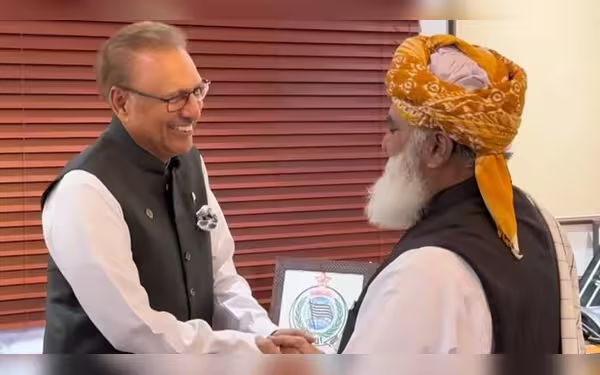Saturday, November 16, 2024 05:54 PM
Alvi and Fazl Unite Against Government Amendments
- Alvi meets Fazl to discuss constitutional amendments.
- Opposition parties seek unity against government proposals.
- Collaboration aims for consensus in parliamentary process.
 Image Credits: thenews.com.pk
Image Credits: thenews.com.pkAlvi and Fazl meet to unite opposition against controversial constitutional amendments in Pakistan.
In recent political developments in Pakistan, the opposition parties are intensifying their efforts to challenge the coalition government's proposed constitutional amendments. This situation has led to significant meetings among key political figures, including a notable visit by former President Dr. Arif Alvi of the Pakistan Tehreek-e-Insaf (PTI) party to the residence of Maulana Fazlur Rehman, the chief of Jamiat Ulema-e-Islam-Fazl (JUI-F). This meeting took place on Tuesday and marks a crucial step in the ongoing political discourse.
The backdrop of this meeting is the coalition government's push to pass constitutional amendments that many in the opposition view as controversial. The PTI, under Alvi's leadership, is particularly concerned about these amendments and is seeking to unite various opposition factions to present a united front. During the meeting, both leaders expressed their commitment to collaborate and address the objections raised by their respective parties.
"Both parties agreed on working together to resolve all objections and finally present a consensus draft according to parliamentary procedure," stated a spokesperson following the meeting. This statement highlights the willingness of both parties to engage in dialogue and find common ground, which is essential in a politically charged environment.
The significance of this meeting cannot be understated. It reflects a broader trend in Pakistani politics where opposition parties are increasingly recognizing the need for unity in the face of legislative challenges. By coming together, they aim to strengthen their position and ensure that their voices are heard in the parliamentary process.
As the political landscape continues to evolve, it remains to be seen how effective this collaboration will be in influencing the outcome of the proposed amendments. However, the willingness of leaders like Alvi and Fazl to engage in constructive dialogue is a positive sign for the democratic process in Pakistan. It underscores the importance of cooperation and consensus-building in a system where diverse opinions must coexist.
The meeting between Dr. Arif Alvi and Maulana Fazlur Rehman serves as a reminder of the dynamic nature of politics in Pakistan. As the opposition rallies to challenge the government's proposals, the focus will undoubtedly remain on how these alliances develop and what impact they will have on the future of governance in the country. The coming days will be crucial as both parties work towards a consensus that could shape the legislative landscape for years to come.













